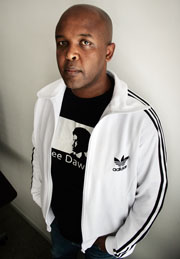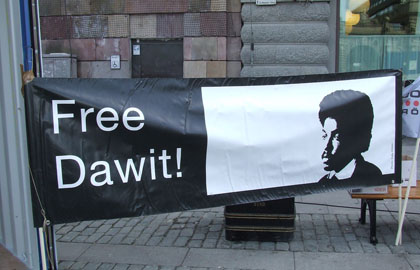In 2001, Eritrean security forces imprisoned Eritrean-Swedish journalist Dawit Isaac along with nine other journalists without trial in September 2001. The arrests effectively shut down the nation’s fledgling independent press and any potential political dissent prior to scheduled December 2001 elections, which were subsequently cancelled. To this day, Dawit is believed to be held incommunicado in a tiny cell in poor health. In all the years since his disappearance, Dawit’s brother, Esayas Isaac, has fought for his release. CPJ spoke to him on May 24, during the week of Eritrea’s 19th Independence Day:
CPJ: Tell us a little about your brother, Dawit Isaac.

Esayas Isaac: My older brother was always active at an early age. He wrote two books—the first one when he was about 23 years old. It was a sort of Eritrean version of Romeo and Juliet. He won awards for his writing and was popular both in Europe and Eritrea. Before becoming a journalist he worked with a children’s theater in Eritrea. He then became a co-owner and reporter for Setit, an independent weekly in 1997. It was a critical paper and tried to push for more democratization. The government clamped down on this.
CPJ: When your brother was arrested what did you do?
EI: I was in Sweden and was in shock. I remember calling Amnesty International and the Swedish government directly. It was hard to get journalists to take interest in Dawit’s case—most journalists were focusing on 9/11 and few had any interest in the politics of a small African country like Eritrea. But Dawit’s arrest felt like my own personal 9/11. I essentially became a reluctant activist, fighting for my brother’s release.
CPJ: When did you start the “Free Dawit” campaign?
EI: A group of four of us started FreeDawit.com in September 2004. But we all thought it was a temporary battle, no one believed he would be imprisoned for so long. But we still continue to fight.
CPJ: What are some of your group’s recent actions?
EI: Marking Eritrea’s Independence Day on Monday, we have written a petition calling on EU governments to play a more active role in fostering Dawit’s release and push the Eritrean regime to allow him access to medical attention. As it stands, the EU still provides aid to Eritrea, which helps fund the prisons that hold my brother. He is in a critical state.
CPJ: Since attaining information from Eritrea is extremely difficult, how do you know about your brother’s health conditions?
EI: You are right, Eritreans are afraid to speak out and so there is a vacuum of information. Even worse, a lot of pro-government types call me up to confuse the issue. They often make empty promises that they will release him. It was only after one of the prison guards escaped to Ethiopia that I managed to find out about my brother. I met the guard three weeks ago and he told me about Dawit’s health getting worse and worse. He could end up dying like his friend and colleague, Setit publisher Fesshaye “Joshua” Yohannes [who died after a long illness in prison in 2007. He won the CPJ International Press Freedom Award in 2002]. Now it’s the hot season in Eritrea and Dawit is stifling in a tiny cell. The conditions are truly unbearable. People ask me how I can keep fighting for my brother after such a long time. The truth is it is Dawit who is the one fighting for our rights.
CPJ: What about the Eritrean Diaspora? Have they rallied behind your cause to free your brother?
EI: There are about 3,000 Eritreans in Gothenberg, Sweden’s second largest city, but only 25-30 of them showed up for a protest we organized recently. Most of the 3,000 knew Dawit but they won’t support him. Some fear a reprisal against their family or business back in Eritrea, others simply don’t care. Eritreans I used to speak to avoid me now that I am involved in activism. It’s a very challenging and lonely experience.
CPJ: What about the international community? Are they doing enough?
EI: The international community must put more pressure on Eritrea. It is not only for Dawit or for Sweden but a human rights issue that affects all of us.
CPJ: Monday marked Eritrea’s 19th Independence Day. How do you feel about this commemorative day? And what predictions for the future do you have for Eritrea’s press?
EI: It’s an important day for Eritreans—a lot of people died in the struggle for this independence. We should show respect for those who died and their families on this day. But my dreams of Eritrea’s future after the 1991 independence are far different today. Today’s celebration of independence is not for all Eritreans—only those who support the ruling regime. Many people don’t celebrate anymore since these celebrations are organized by pro-government groups. Our press today reflects our Independence Day celebrations, it is only pro-government. Many Eritreans know that a critical press is important and I hope in the future we will go back to having a free press. Those who want push for a free press, I encourage them to join our movement at FreeDawit.
EDITOR’S NOTE: The original text of this entry was modified to correct the spelling of Isaac and the date of Eritrean independence.
